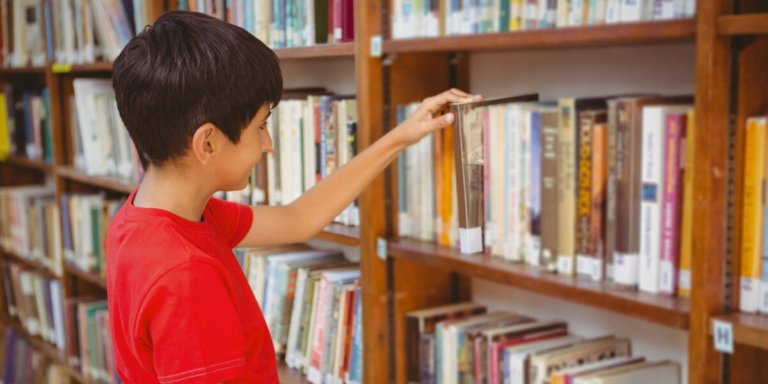
A study commissioned by the Great School Libraries campaign has revealed that one in eight schools in the UK don’t have a library.
Plus, poorer children were found less likely to have access to one compared to those from higher socioeconomic backgrounds.
According to The Independent, “A survey of 1,750 schools across England, Wales and Northern Ireland, found that 87 percent have access to a designated library space – but around one in eight (13 percent) do not.
“It shows discrepancies between rich and poor, as more than nine in 10 (91 percent) of schools that have less than 10 percent of pupils eligible for free school meals (FSM) have a library area.”
The study also showed that primary schools are less likely have a library compared to secondary schools, and that libraries are often used as classrooms or meeting rooms.
The BBC reported that, “Schools in England were more likely to have a library (nine in ten schools surveyed here had one), but this figure dropped dramatically for schools in Wales (fewer than seven in ten) and Northern Ireland (fewer than six in ten).”
The study also stated that access to books is known to have plenty of benefits for students such as improved reading and writing skills.
I am a writer, editor, parent (and library-raised child), and I believe every child deserves a great school library. I spent some years as a reading support volunteer and saw the huge difference it made to put just the right book in a child’s hand. #greatschoollibraries https://t.co/MVFj4ApaDe
— mairirua (@BastinMairi) October 18, 2019
The problem is not confined to the UK either; around the world, school libraries are slowly dying off while computer labs and makerspaces become more commonplace.
Budget restrictions in government schools force schools to choose the facilities that are perceived as more necessary – such as arts centres or sporting facilities.
As Shane Phipps, an author and teacher in Indianapolis, US, recently wrote in NewsandTribune, “In a disturbing national trend, school libraries have been on a steady decline for the last decade.
“I’m an education insider and I wasn’t even aware of this until this year when my own school eliminated our library. When that happened, all kinds of red flags went up for me and I began to look into it.”
He wrote that there are several factors at play that are leading to the extinction of school libraries. “A large and ever-growing percentage of school districts have gone to 1:1 technology.
“In other words, all students have some sort of electronic device from which they do most of their reading. In this process, physical books, including textbooks, have become much more scarce in schools.”
A growing awareness of preserving school libraries
One of the worst losses for children in poor schools is the loss of a school library with a real librarian. https://t.co/sfsVqMyx59
— EveryLibrary (@EveryLibrary) October 15, 2019
In the digital age, are libraries slowly dying out because kids are tuning into iPads and computers for entertainment or reading purposes?
Most people from the millennial generation and before know there’s nothing quite like the joy of sitting in a quiet library, sifting through stacks of bookshelves, or checking out several books at a time to take home.
It’s sad to think that the current generation will not have these similar experiences. Reading from the screen, while convenient, is just not the same as reading printed material.
Research has shown that children and even adults absorb subject matter better through printed text rather than on-screen. Plus, too much exposure to screens and blue light has a damaging effect on the eyes, particularly in small children – known as digital eyestrain.
As Phipps wrote, “I can assure you that many students do not like to read from a screen. I can relate to that as I, too, much prefer an actual book.
“There have been many studies released in recent years indicating that many students learn better from physical textbooks than from the electronic versions.
“There is something about the tactile nature of touching or running ones fingers over an actual page of text that is lost with ebooks. That is a big deal for some students.”
Hopefully, studies like the one done by the Great Libraries campaign, can spur change and help reverse the dying trend of school libraries.
According to the BBC, “In September 2018, it was announced that more than 450 children would be helping to shape a plan in Scotland to make sure that all school pupils have access to a “dynamic” school library. The Scottish government said the plan was the first of its kind in the UK.
“It said the strategy was designed to improve reading levels, put libraries at the very centre of school life and – according to deputy first minister and education secretary John Swinney – make school libraries “a place of contact, friendship, dialogue and reassurance.”
Nick Poole, boss of the UK’s library and information association CILIP, said, “The findings highlight the urgency of securing national school library strategies and investment in England, Wales and Northern Ireland, drawing on the example of Scotland.”
It looks like libraries are not going extinct anytime soon – but it will take plenty of effort from all parties to ensure kids can still reap the benefits of reading in school libraries.
Liked this? Then you’ll love…
4 futuristic school libraries that inspire learning
This foundation provides downloadable blueprints for efficiently-built school libraries







